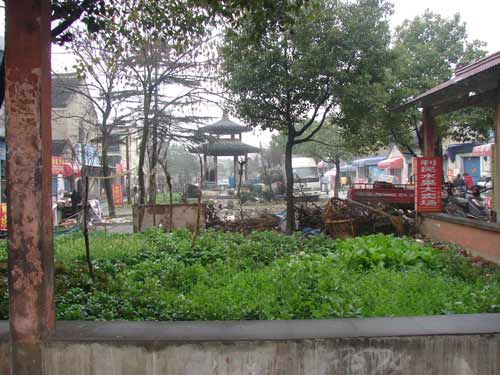Here in China you are drawn to places crumbling under the fingertips, muddy spots where people have shat or died or both. Your hands and shoes flake off plaster or bark where hundreds of hands have scraped off bits of history and caressed plaster and brick into homes. Those Chinese hands have all too often cupped grief, no money, or are a place to store tears. You are drawn to the image of broken eggs on trays, carefully placed out to sell, for nothing of value should be lost.
Nearby, street hawkers peacefully peddle their wares.

* * *
A clatter: poles used to hang clothes for sale collide as the street hawkers jump to their feet and start shoving shirts and blouses into large bags. Police vans skid to a halt nearby, loudspeakers barking commands that they cannot be here, they cannot sell, they are not legally able to do this. Cannot, cannot….
The sellers bundle away their only means of livelihood (did they make enough today to feed their children?). There is probably little that upsets me more than poor people trying to earn a clean living and having that taken away from them.
The police pile out of the vans and watch the bowed people scoop into bags their street wares. The hawkers are silent, too frightened to protest. Soon they are scampering off home, assuming they have one, as often they are from another province, aliens here in Suzhou.
Years ago the police raid would have made little sense to me. These hawkers are here every day, peacefully selling clothing and bric-a-brac. But once you have been a “foreigner” in China for a while it makes bitter sense: some authority higher up in the food chain is not getting his bribe to leave them at peace.
Because in a day or two’s time these hawkers, like hunter-gatherers, will be back, and police in vans will roll pass, ignoring them now.
I am so glad to see the sock lady I have written about, had magically disappeared before the raid. She still often enquires about my health, makes me feel at home.
* * *
You feel it is just the pagoda elbowing you into silence. But what also nudges you is the leaves weeping off the trees to make way for the new baby breaths of spring, the refuse in the tiny garden of crops amid the alleyways. You are drawn to the mess. A fruit seller wanders past to greet you, as she often does, with her little boy. Her face has everything you could ever need: she has no craving to belong, to belong somewhere, a country to call her own. Simplicity has cleansed her. Or rather, it has kept her clean. “Can I email you these photos?” you, the foreigner, ask her in Mandarin. “I have no email, no computer,” she replies. Her face is free, a handkerchief blowing away, now curling into a smile, then tumbling into a frown, always serenely winking its secrets at you.
Her face is one of those broken eggs: treasured by her child and fruit-selling husband. “Say hello to the big uncle,” she coos to her child in Mandarin, referring to this foreigner who has often bought fruit from her. One day she and the foreigner will coax her child into saying that magic word, “Hello”.
* * *
While watching the hawkers pack their lives away, I touch the camera dangling against my stomach. Slowly I ease off the lenses’ cap, the cops’ backs turned to me while they crack out commands at the street sellers. With the camera held at my waist I am casually about to take a photo when a cop turns around and glares directly into me. Dramatics aside, for a moment I feel his black eyes are knives slicing me open. How the hell did he know I was about to take a pic? A signal from a bystander? This country is full of spies.
Unnerved, I trudge off without taking that photo. I am also unnerved because I am so used to the Chinese being such an amiable bunch. But that policeman’s glare, and the bloodhound, sniffing intellect burning in the glare, was a look of another kind which I have witnessed a few time in China, but thankfully not that often. Among other things, that glare tells me I know I don’t belong here; he knows I don’t belong here. Stay out of our affairs. Watch it.
* * *
Hello: a word as warm as a hearth, the core of a home. Where is home? Africa? Ireland? Here in China home is 家 jia, the ancient pictogram of a pig under a roof: he who has enough livestock has sufficient, can be grateful. But what’s left now for you, for those hawkers? The breath blown down the chimney into that place of chairs, bed, rugs, dust.





